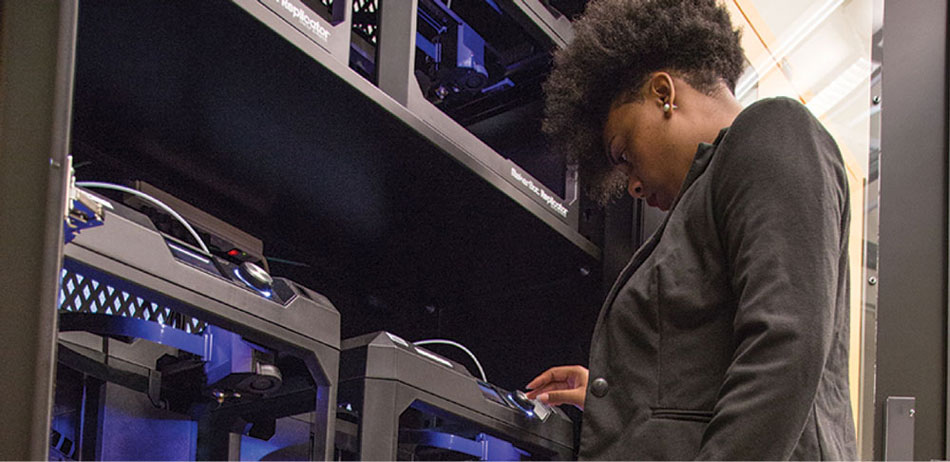VCU Department of Mechanical & Nuclear Engineering opens Innovation Laboratory

At the Virginia Commonwealth University School of Engineering, students are designing the future – and printing it in 3D in the new Mechanical & Nuclear Engineering (MNE) Innovation Laboratory.
VCU’s Department of Mechanical & Nuclear Engineering worked with 3D printing industry leader MakerBot to establish the Commonwealth’s first Innovation Laboratory featuring a MakerBot Innovation Center. The MNE Innovation Laboratory facilitates rapid prototyping of devices with a manufacturing suite that features thirty MakerBot Fifth Generation Replicator Desktop 3D Printers and three MakerBot Replicator Z18s for producing extra-large objects. It will also house 3D scanners and digitizers to allow for reverse engineering capabilities.
The MNE Innovation Laboratory will be located in East Engineering Hall. Due to the enhanced networking capabilities of the facility, students will have the ability to use the 3D printers from off-campus locations using the MakerBot Innovation Center Management Platform. MakerBot’s high-quality 3D printing output, reliability, and superior technical support factored into VCU’s decision to work with the company to present this state-of-the-art learning resource.
The facility dramatically increases all engineering students’ access to 3D printing, also known as additive manufacturing, which is becoming an essential component of 21st century education in design engineering and product development.
“The new MNE Innovation Laboratory will provide VCU students with the latest tools to rapidly turn their creative ideas and inventions into working prototypes,” said Gary Tepper, Ph.D., chair of the Department of Mechanical & Nuclear Engineering. “Students learn academic concepts in the classroom, but they get tremendous satisfaction and a much deeper understanding when they apply their engineering skills to build and innovate.”
The ability to design, fabricate and test sophisticated prototypes quickly in-house allows students to investigate unforeseen problems and improve functionality early in the design process.
“Students often create designs on a computer and think it’s right. Often it’s not,” said L. Franklin Bost, executive associate dean of innovation and outreach. “When prototypes are made via 3D printing, required design modifications can be quickly identified. That’s the learning moment and speeds the development process.”
Students of many levels and engineering disciplines will experience those kinds of learning moments in the MNE Innovation Laboratory. MNE’s computer aided design (CAD) and additive manufacturing courses will make substantial use of the laboratory for mechanism design projects such as soap box derby cars, trebuchets and Leonardo da Vinci’s armored car invention. VCU’s computer-aided engineering courses will also use the lab for team projects.
“It will foster a hands-on learning environment for the entire School of Engineering. When we started thinking about this last year, rapid prototyping for product development was becoming a hot item for undergraduate studies and Capstone projects. This technology is providing students with practical engineering experience that reinforces design, innovation and engineering concepts related to all disciplines within the field of engineering,” said Charles Cartin, Ph.D., director of the MNE Innovation Laboratory.
The laboratory’s resources will be invaluable next spring during VCU Engineering’s signature Capstone Design Expo, an annual event that showcases engineering seniors’ innovative research and design prototypes. Cartin also foresees collaborative mechanical, nuclear and biomedical engineering projects such as the development of new medical devices for cancer treatment or drug delivery taking place in the MNE Innovation Lab.
The facility will also support all nuclear engineering courses related to the design and manufacture of nuclear systems. Students within the mechanical engineering curriculum focusing upon the nuclear concentration will use the new 3D printing suite to design, fabricate and test various devices related to the nuclear engineering undergraduate curriculum.
“The equipment in the MNE Innovation Laboratory will allow our nuclear engineering students to easily evaluate the performance of various accident tolerant nuclear fuel concepts or innovative passive safety systems for advanced nuclear reactor designs,” said Sama Bilbao y Leon, Ph.D., director of VCU nuclear engineering programs. “Having the opportunity to hold a sophisticated component in their hands permits students to perceive the nuances of a design and assess the potential for improvement.”
“It’s exciting that the MakerBot Innovation Center at VCU’s MNE Innovation Laboratory has applications that are unique – prototyping nuclear engineering innovations at scale is something we haven’t seen before.” said Wallace Patterson, global director of educational enterprise sales for MakerBot. “Clearly the leadership at VCU is concerned with giving all of their engineering students access to the tools they’re going to use every day to find real world solutions when they graduate.”
The new laboratory also equips the university to challenge and inspire future engineering students. Its resources will figure prominently in a middle school outreach program starting in summer 2017. The weeklong program will feature daily activities related to engineering, such as design, innovation, and product development. In the process, the participants’ access to CAD and 3D printing will help them refine their design, development, and collaboration skills.
“The MNE Innovation Lab will allow engineering students to develop their intellectual curiosity and problem solving skills, which is essential in real-world applications. This lab will assist in that endeavor by educating students to view problems from multiple perspectives applying creativity, fresh perspectives, and ideas. It prompts students to ask ‘why not?’ when presented with a solution that would strike others as too difficult to apply or implement, and to take ownership in their work by wanting to exceed expectations/goals and to think outside of the box with any given project. This Innovation Laboratory will allow students to transform a conceptual idea into a fabricated product, reinforcing the engineering design and troubleshooting process from start to finish,” said Tepper.
Categories Departments, Mechanical & Nuclear Engineering